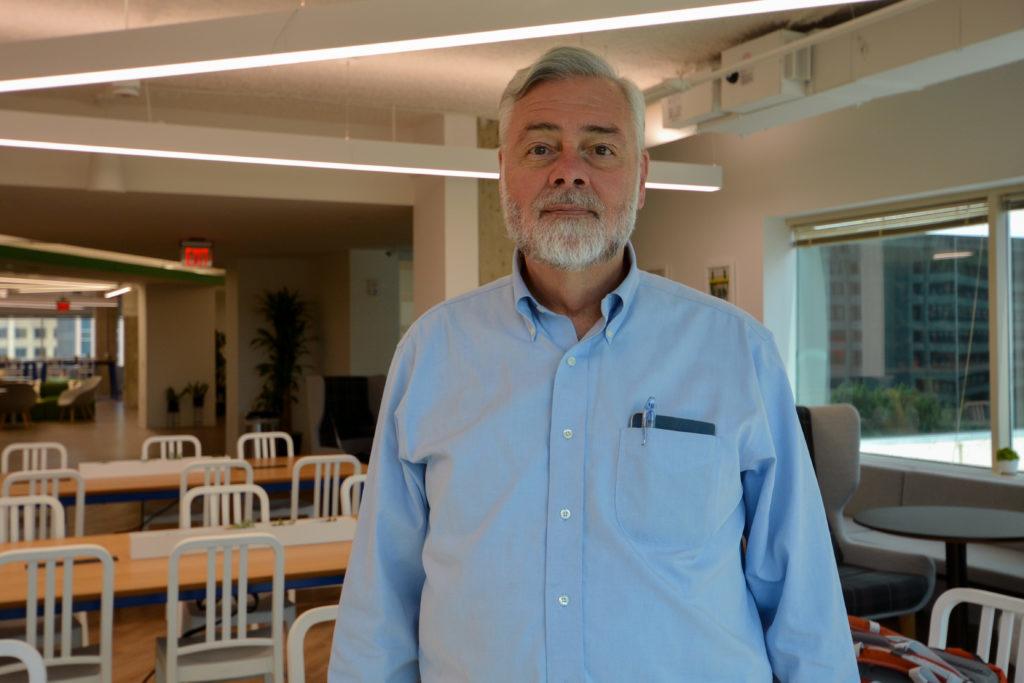Officials dedicated space on campus for members of the GW community to receive guidance about their startup ideas from advisers and industry experts.
The Innovation+Entrepreneurship Lab, located at the 2000 Penn complex, includes open coworking space and conference rooms and is open to students, faculty, staff and alumni during business hours. Lex McCusker, the director of student entrepreneurship programs in the Office of Innovation and Entrepreneurship, said the lab allows people to take advantage of resources – like student advisers and workshops – to flesh out their ideas.
“It’s a one-stop-shop for all things innovation and entrepreneurship on campus,” McCusker said in an email.
McCusker said officials, looking for a place to house the I+E Lab, approached MakeOffices – a company that offers office space rentals – soon after the firm opened its coworking space in The Shops at 2000 Penn in June, which resulted in a partnership “soon thereafter.” He added that MakeOffices has donated the space to use for the lab for a year.
In addition to the physical space, McCusker said student entrepreneurship fellows – students dedicated to providing assistance to peer “innovators” – and office staff are present in the lab every day to provide access to resources and assist visitors to the lab.
The lab will also feature business executives and entrepreneurs from various companies like the Global Good Fund, a nonprofit that provides leadership coaching and mentorship, who can help students “navigate the startup world,” he said. McCusker said students can schedule appointments in advance with mentors or drop in any time the lab is open.
He said students and student organizations working on “selected student ventures” can participate in the lab’s Innovator Access Program, which grants 24/7 access to the space.
He said the lab will provide all students with its own free WiFi, refreshments like coffee and tea and “a space to work on their ideas.”
Students who have used the lab’s resources said the lab has given them the ability – through resources like one-on-one advising – to grow their ideas past their initial stage.
Ameen Iraki, a freshman majoring in business, said he visited the I+E lab last week for a tour. He said he plans to take advantage of the “entrepreneurial activities” that the lab offers – like Social Impact 360, a mentorship program through the lab that focuses on social entrepreneurship – to look for assistance on potential business ideas.
Cameron Cayer, a freshman majoring in international affairs and a Hatchet reporter, said he presented a business idea to lab advisers about an online resource to help people in abusive relationships identify and learn about the dangers of those types of relationships. Cayer said they told him to research his topic more and conduct in-person interviews with people who may be interested in his business, which he is currently working on.
“I think it’s awesome that we have a space on campus solely available for entrepreneurship,” he said. “And I’m in Elliott, so I’m not even in the business school, and I think that’s awesome that I can go there.”
Entrepreneurial experts said an innovation lab can give students with potential for entrepreneurial success the resources needed to make their plans a reality.
Ari Ginsberg, a professor of entrepreneurship and management at New York University, said administrators increasingly see the mission of a university as both educational – relaying knowledge – and research-oriented – creating knowledge. He said innovation and entrepreneurship labs like GW’s help students accomplish both aspects through real-world practice.
“The idea is not to do that in an ‘ivory tower’ fashion but to make the kind of impact where recipients of that education are the ones that carry out the research and create new ideas and new inventions and make an impact,” he said.
He said NYU administrators offer all their students access to Leslie eLab, a similar innovation lab space, to support students’ entrepreneurial endeavors and assist with different areas of the entrepreneurial process, like prototyping and marketing.
“It’s not just absorbing knowledge in a classroom,” he said. “It’s also an innovation experience – it brings out the creativity and innovativeness of a person, and that’s always kind of what gives meaning to peoples’ lives, and that’s what makes them feel alive and energized.”
Ben Compaine, a part-time lecturer of entrepreneurship at Northeastern University, said his university’s IDEA Lab is a student-run venture available to all students, alumni, faculty and staff. Compaine said any mechanism that can provide an opportunity for collaboration among like-minded students “has got to be a benefit” for those involved.
“Students tend to have energy and often great ideas but not much expertise or experience in making them operational,” Compaine said in an email. “Combining the energy and motivation of early-stage entrepreneurs with those who have ‘been there, tried that’ can help a nascent venture avoid some common mistakes and optimize the possibility of creating a successful venture.”








